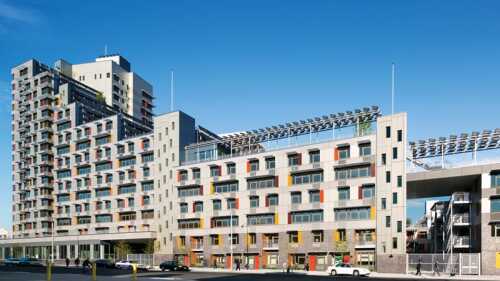At a February 2007 press conference at the National Press Club in downtown Washington, D.C., Ron Terwilliger announced the establishment of the ULI Terwilliger Center for Housing, saying, “I am committed to this because I believe in the urgency of expanding workforce housing. Everyone believes in providing decent housing when you ask the question, but no one wants people making less money living next to them. I believe our center can make a real difference in improving this unsatisfactory situation. . . . If we do not act now to bring housing and jobs closer together, we will seriously impede the ability of America’s cities to compete with cities around the world.”
A few miles away from that event, the 8.5 acres (3.4 ha) next to the Rhode Island Avenue–Brentwood Metrorail station was a commuter parking lot; surrounded by declining neighborhoods, it was a bleak place to leave a car and catch a train. Now, just six years later, the site has been transformed into Rhode Island Row, a thriving 274-unit mixed-use community offering affordable, workforce, and market-rate apartments; 70,000 square feet (6,500 sq m) of retail space; and upscale amenities, including outdoor fireplaces, a large outdoor wet bar and grills next to the pool, concierge services, a state-of-the-art fitness center, a green roof patio, and a sleek, thoughtfully appointed wood-and-glass community room with wi-fi access, lounging areas, large-screen televisions, a pool table, and an area for entertaining.
However, while all the perks are appealing, perhaps Rhode Island Row’s biggest draw is convenience: the Metro station is just steps away. “I wanted to live here because I can walk across the street and be on the Metro,” says community resident Melanie Clark, who moved into Rhode Island Row from a suburban neighborhood outside Baltimore. “Before [moving in], I did not have the same access to Washington. Living here has changed how I interact with the city. It’s streamlined my life in a way that is fantastic.”
The development—a 2012 winner of a Terwilliger Center’s Jack Kemp Workforce Housing Models of Excellence Award—exemplifies Terwilliger’s vision of mixed-income housing, which he considers the only viable solution to address the shortage of affordable housing near transit and employment hubs. The site, owned by the Washington Metropolitan Area Transit Authority (WMATA), lies less than two miles (3.2 km) from the city’s central business district and only two stops from Union Station, a regional multimodal transportation hub. Its transformation from a parking lot into Rhode Island Row was made possible through a public/private partnership with WMATA and Bethesda, Maryland–based Urban Atlantic, which developed the community in a joint venture with A&R Development, with offices in Baltimore and Washington. Open just over a year, the community is 95 percent occupied; among the residents are D.C. police officers, Metro workers, teachers, and graduate students from area universities.
The approach to the development—from the financing to the amenities—reflects in large part Terwilliger’s imprint on the career of Urban Atlantic president Vicki Davis, who worked at Trammell Crow Residential as a real estate developer in the mid-1980s and now serves on the Terwilliger Center’s advisory board. “Ron was hugely influential,” she says. “He indoctrinated the importance of only doing deals we knew would work and which were risk-adjusted for what we were producing. We also learned about using replicable design to hold down costs and the importance of providing great amenities and services.”
Another lasting impact: during Davis’s years at Trammell Crow Residential, the company developed some mixed-income housing—a relatively new concept at the time. “We learned that people with different incomes can live side by side without any knowledge by anyone that there is any significant difference,” she says.
While Urban Atlantic’s work ranges from the redevelopment of public housing to the development of luxury homes, the firm’s success in developing mixed-income communities (the company’s Capitol Quarter, also in D.C., is another Kemp Award recipient) is a particular source of pride for Davis. “If you understand this business, you can make affordable housing work with the correct capital stack that offsets the expense. Knowing that it can be done is the first step. And, it can be done.”





